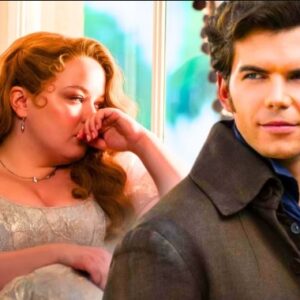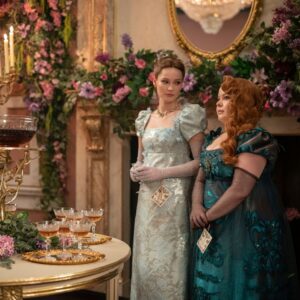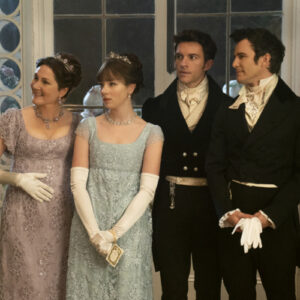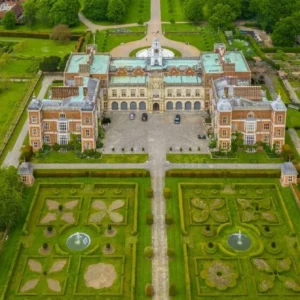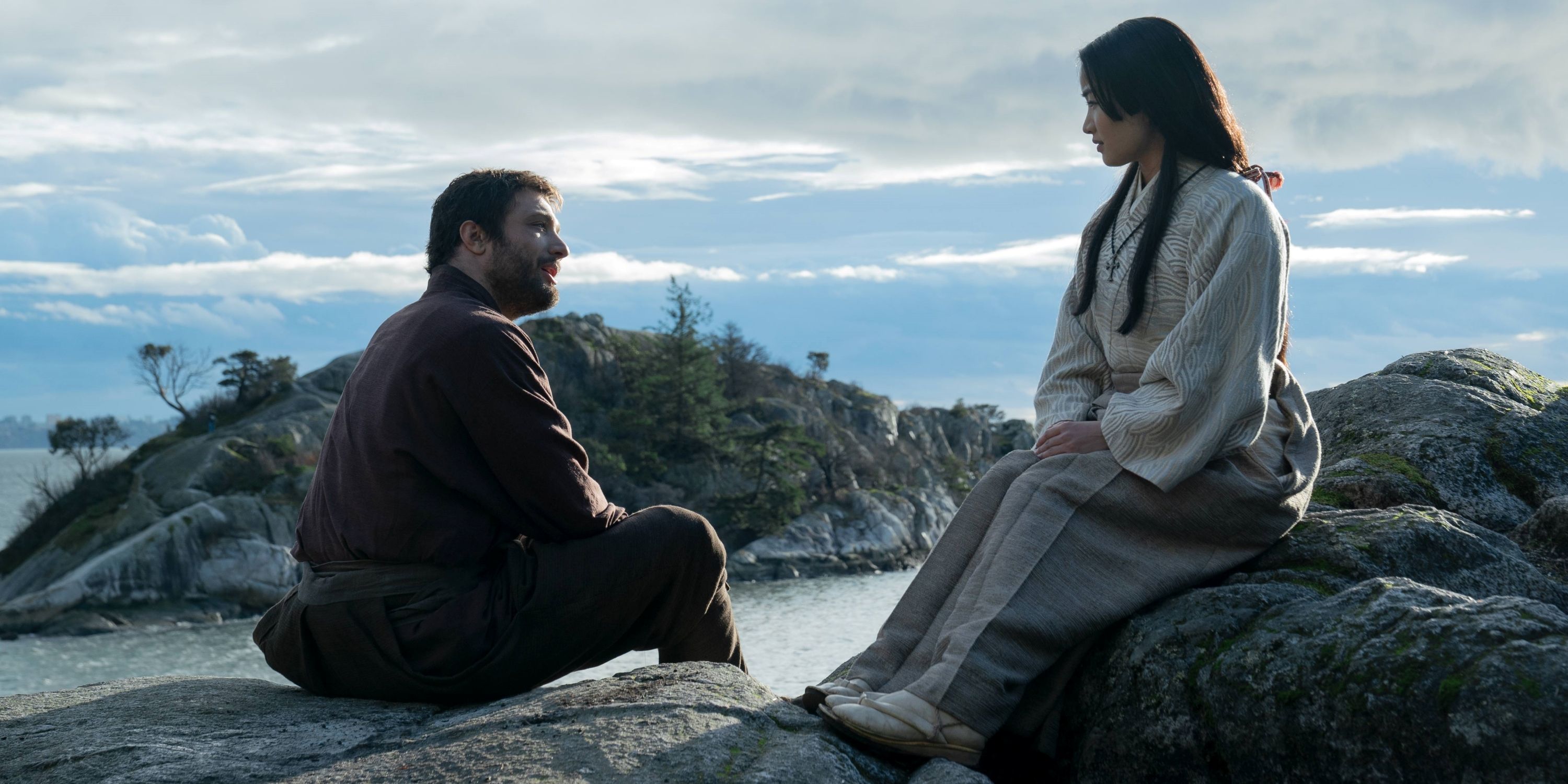
If you’re like me, you love a good romance. Specifically, a historical one, and bonus points if it amplifies the surrounding story’s themes. Of all the heady topics Shōgun interrogates, romance might not seem like an applicable candidate. Yet Lady Toda Mariko (Anna Sawai) and John Blackthorne’s (Cosmo Jarvis) undeniable connection is the series’ secret heartbeat. As each episode unfolded, I held my hopeful breath. Would they overcome their differences and kiss? Once they did, would they reunite? After Episode 8, the second question’s answer appears to be a non-starter. With Mariko headed to Osaka at Lord Yoshii Toranaga’s (Hiroyuki Sanada) behest and Blackthorne backsliding into his survivalist nature, their doomed “almost” love affair seems concluded.
Reader, I am tormented. Admittedly, a Game of Thrones quote comes to mind: “If you think this has a happy ending, you haven’t been paying attention.” Nevertheless, a woman can dream. Episode 6’s devastatingly intimate brothel scene fed us well, but I crave more: enough to consider tossing things at my television when Episode 8’s credits rolled. I experienced renewed hope over Episode 9’s trailer, followed swiftly by dread. Shōgun‘s end is nigh, and the apparent loss of Mariko and Blackthorne’s forbidden, barely realized potential is a gut punch. Set in feudal Japan, complicated by war and social mores, overflowing with yearning, perpetually denied, reflecting the wider narrative, and the fact they met only because of cosmic interference — they are the stuff of which epic romances are made. I’m just asking for one more kiss.
‘Shōgun’ Parallels Mariko and Blackthorne
As frequently as their ideals, perspectives, and cultures clash (a seemingly insurmountable trifecta), Mariko and Blackthorne complement one another in ways neither expected nor can replicate in this life. Their convergent journeys have always echoed, because an echo both parallels and distorts. They’re lost souls who discover a delicate and reciprocal human connection. Physically trapped by her abusive marriage to Buntaro (Shinnosuke Abe), socially shamed by her family’s execution, and severed from her childhood best friend Lady Ochiba (Fumi Nikaidō), Mariko’s adulthood has been marked by an emotional drought. She wanders through a desolate, lonely wasteland. The death for which she longs isn’t freedom from life’s miseries but a reprieve from her existence under Buntaro’s brutal thumb.
Mariko’s faith, her sole comfort, is the first thing John Blackthorne’s arrival calls into question. In direct contrast to Mariko, Shōgun introduces Blackthorne as someone who knows his purpose. It’s one of destruction and death, but his stubborn determination weathers starvation and a shipwreck. Ironically, the storm that tosses him onto Japan’s shores strips him of that agency. Blackthorne scrapes by, desperately clawing through a country where his words mean nothing. Threats surround him, primarily the Portuguese Catholics whose settlements the Protestant Blackthorne was charged with decimating. They’re the same individuals in whom Mariko has placed her salvation.
If Blackthorne’s relieved to have the agendaless Mariko as his translator, the lady derives no joy from her task. She willingly obeys Lord Toranaga’s request, but once the two have privacy, Mariko’s hostility emerges. Understandably: he’s an uncouth foreigner accusing her trusted priests of duplicitous subversion. Still, Blackthorne reaches out, albeit messily; Mariko retracts, frostily setting boundaries. So begins their push-pull dynamic, something that’s ripe for evolution.
Mariko and Blackthorne’s Intimacy Develops Naturally on ‘Shōgun’
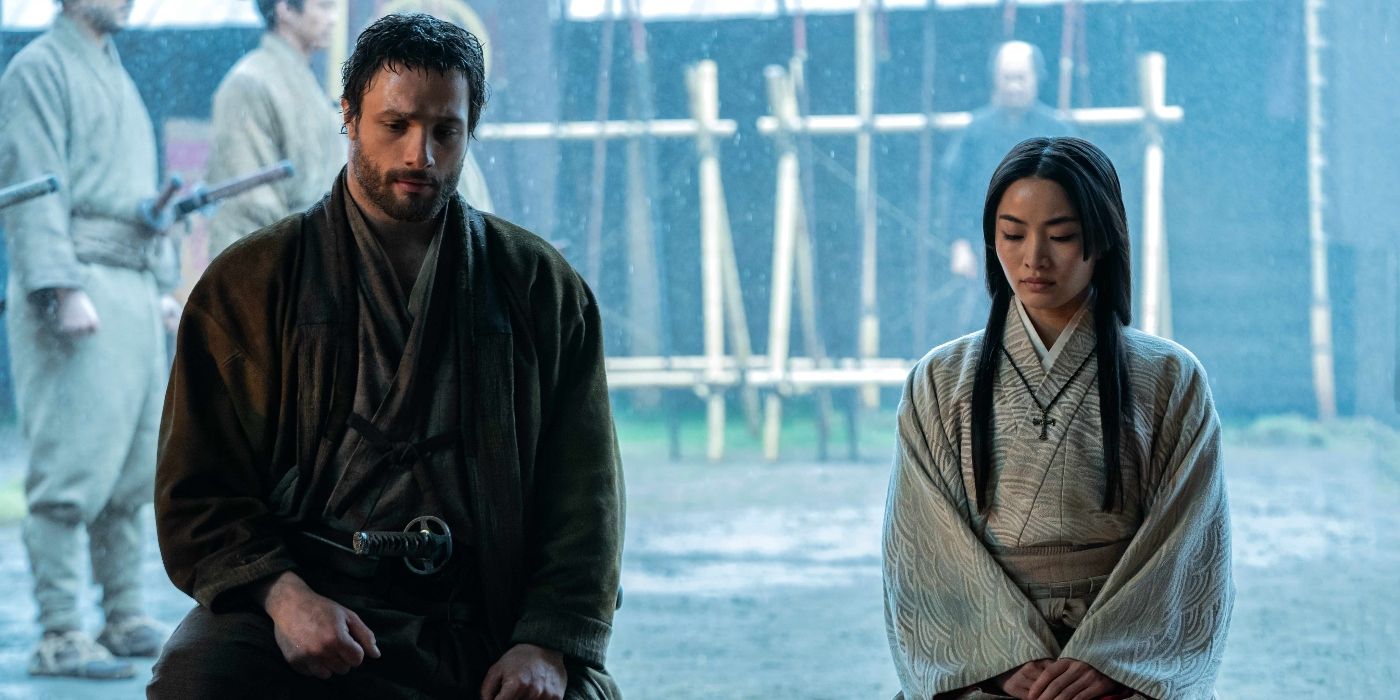
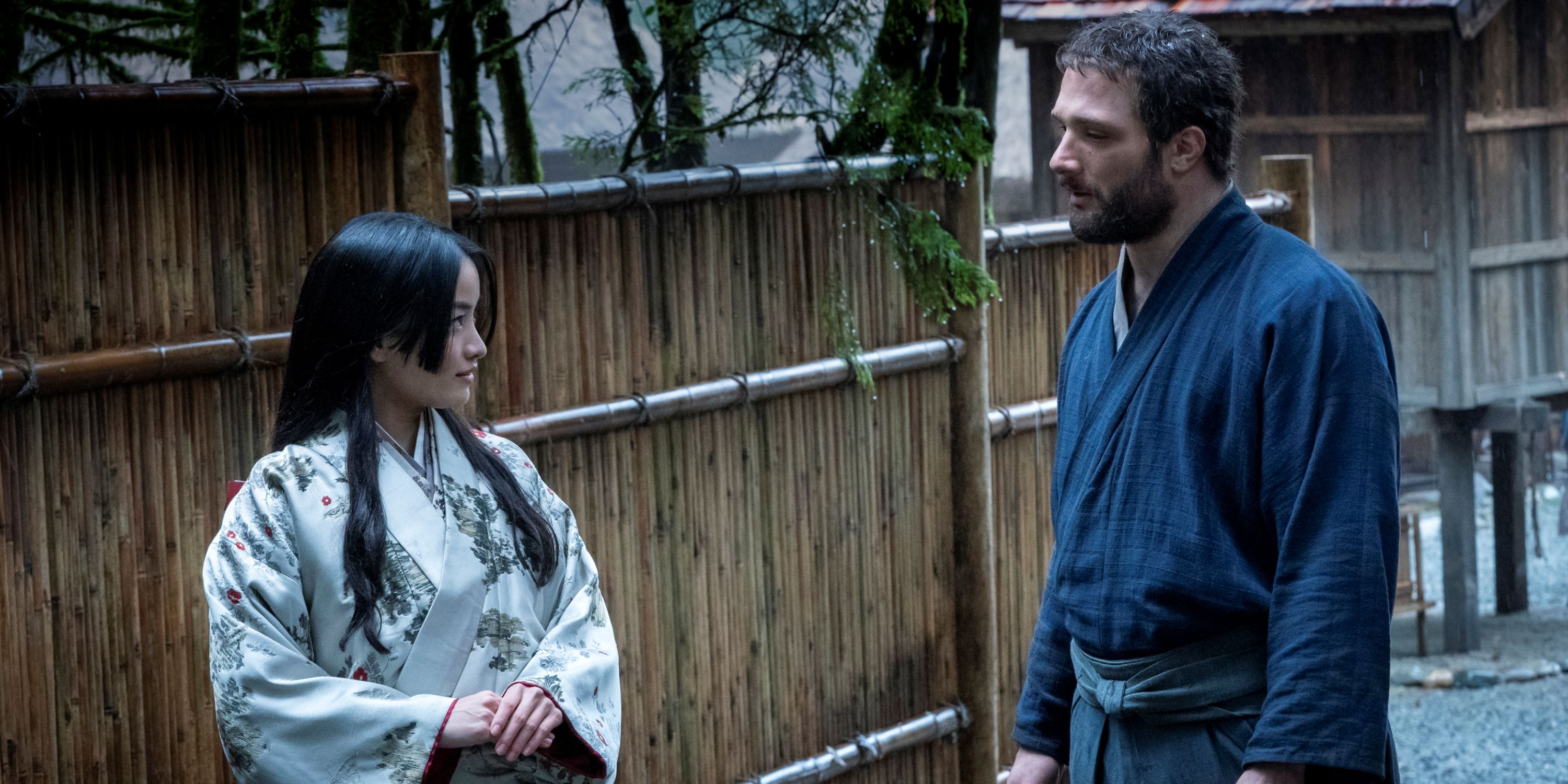
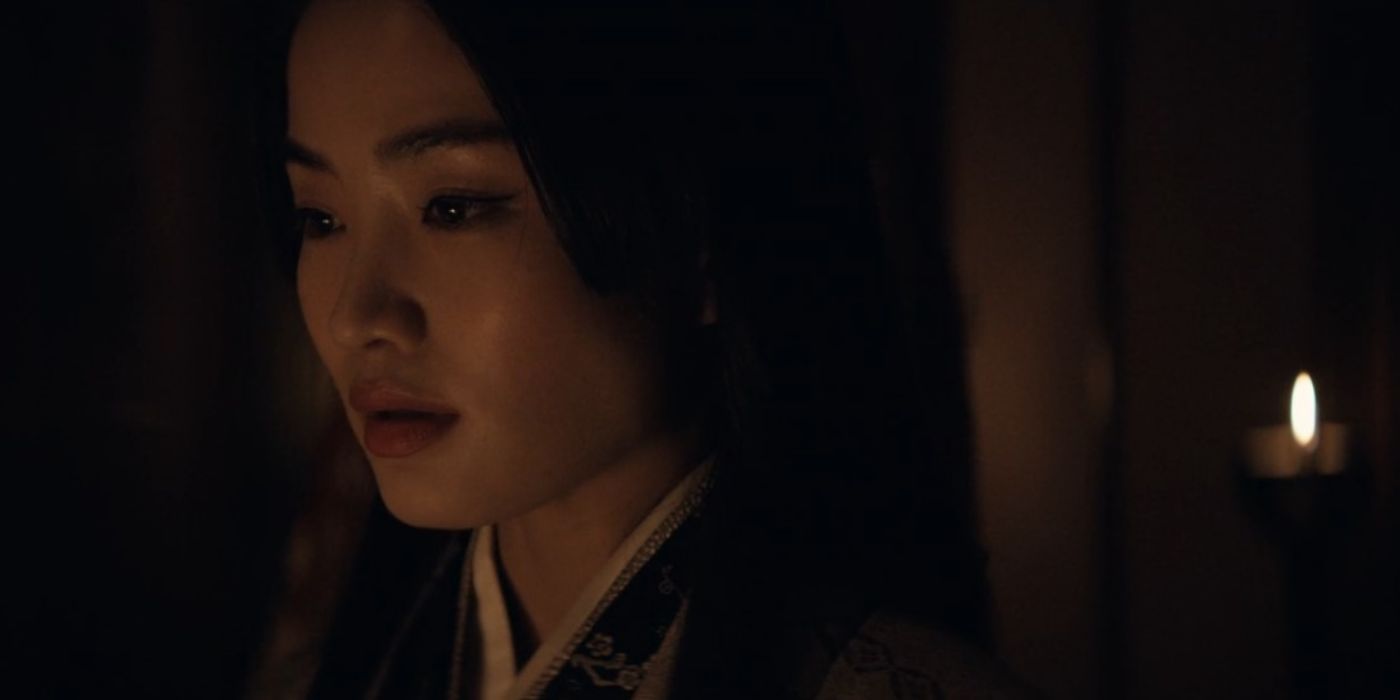
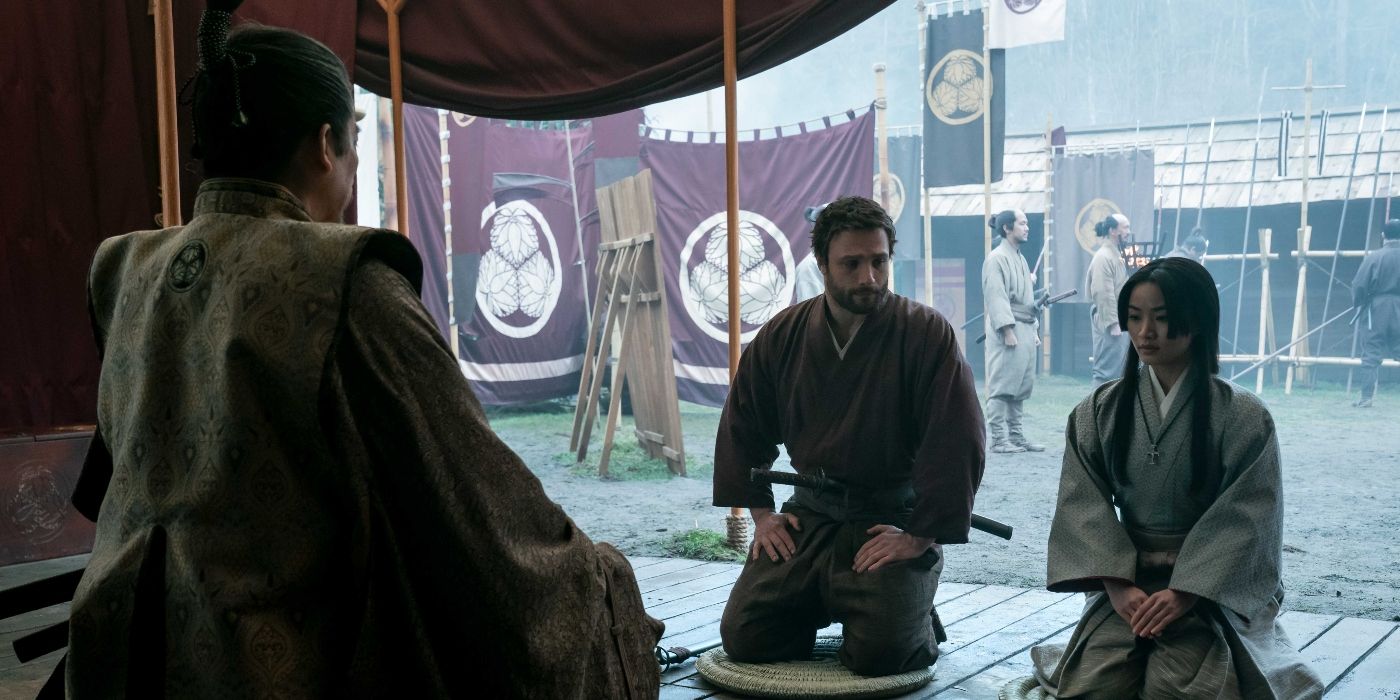
And their relationship indeed evolves. Mariko and Blackthorne are opposites in almost every regard: English and Japanese, Protestant and Catholic, a man with privilege and a woman owned by her husband. John acts impulsively, wearing his emotions on his sleeve. Mariko operates with silent calculation and protects herself through her Eightfold Fence. She fulfills her translator duties, Blackthorne clings to Mariko like a ship’s anchor, and that could be the end of things. Shōgun‘s character work is too consistently good to ignore their potential. And in less aware hands, the white man and the Japanese woman falling in love would just be a tired stereotype.
Instead, Mariko and Blackthorne are the pinnacle of star-crossed lovers. Even when they’re strangers, Mariko protects John through her very intentional translations. (Because she knows how her world works, she’s more successful than John’s explicit attempts to shield her from Buntaro’s abuse.) Speaking Portuguese becomes their private space. Their consistently revealing conversations unearth their innate humanity. Each recognizes the other as more than their dismissive assumptions. Forced proximity can induce an affection born from understanding, and the fact that Mariko and John connect despite their differences makes their relationship poignant — and symbolic, given Shōgun‘s core themes. To use an overused metaphor, they become one another’s safe harbors. They are shipwrecked hearts adrift at sea who float together thanks to the tide’s pull. Their differences are stark, but their similarities are foundational; a nucleus of budding possibility, a hope inside their darkness.
Acknowledging one another’s humanity proves key. Unlike every other man Mariko’s encountered, John Blackthorne recognizes her as a person first and a woman second. He respects her, values her contributions, and seeks her opinion. He never expects contrition, obedience, or silence. Nor does he demand her time, even after they sleep together. Instead, he offers genuinely selfless affection. Blackthorne’s difference, while intriguing enough to warrant sexual attraction, embodies the freedom Mariko lacks. Mariko letting John within her emotional walls says more than their many exchanged words. He sneaks his way through not because he exploits cracks, but because Mariko allows herself to be vulnerable. It’s no great leap to assume Mariko has never been in love. Imagine her surprise when her equal and opposite isn’t just a foreigner, but a man her marriage forbids her from having.
When Mariko is briefly free to choose, she chooses the English hatamato. Antagonism becomes begrudging tolerance, which becomes fond respect, then hushed sex in a darkened room and a deeper kinship perpetually denied by circumstance. When they have no other recourse, John kneels outside Mariko’s room to recite the Lord’s Prayer with her. The door separating them is achingly symbolic. Once again, all they can share are their words — what united them in the first place.
Mariko and Blackthorne’s Romance Echoes ‘Shōgun’s Themes
Viewed through this lens, Mariko and Blackthorne’s romance is a natural extension of their dynamic without compromising either character’s integrity. They discover intimate commonalities even though their meeting-in-the-middle-ground fluctuates like an earthquake. That inescapable push-pull represents Shōgun‘s defining, universal conflict. If either character relented to the other’s viewpoint, neither would remain authentic.
It’s appropriate, then, that Episode 8, “The Abyss of Life,” sees Mariko and Blackthorne caught in said abyss and continuing their disparately parallel journeys. A re-invigorated Mariko seizes control over her destiny. John’s once again reduced to survival mode, except he’s unmoored; what place is there for someone who can’t return to his English ways but can’t integrate with the Japanese?
Even though Mariko and John aren’t one another’s priority, they ache to be. They remain steadfast via their words: Blackthorne dances around his feelings by asking what will happen to “my translator.” Mariko rejects Buntaro’s offer of joint seppuku but doesn’t fall into Blackthorne’s arms. She can’t afford to. When it comes to life-defining missed chances, the soulmate that got away, these two are the historical romance blueprint.
Anna Sawai and Cosmo Jarvis Have Spectacular Chemistry on ‘Shōgun’
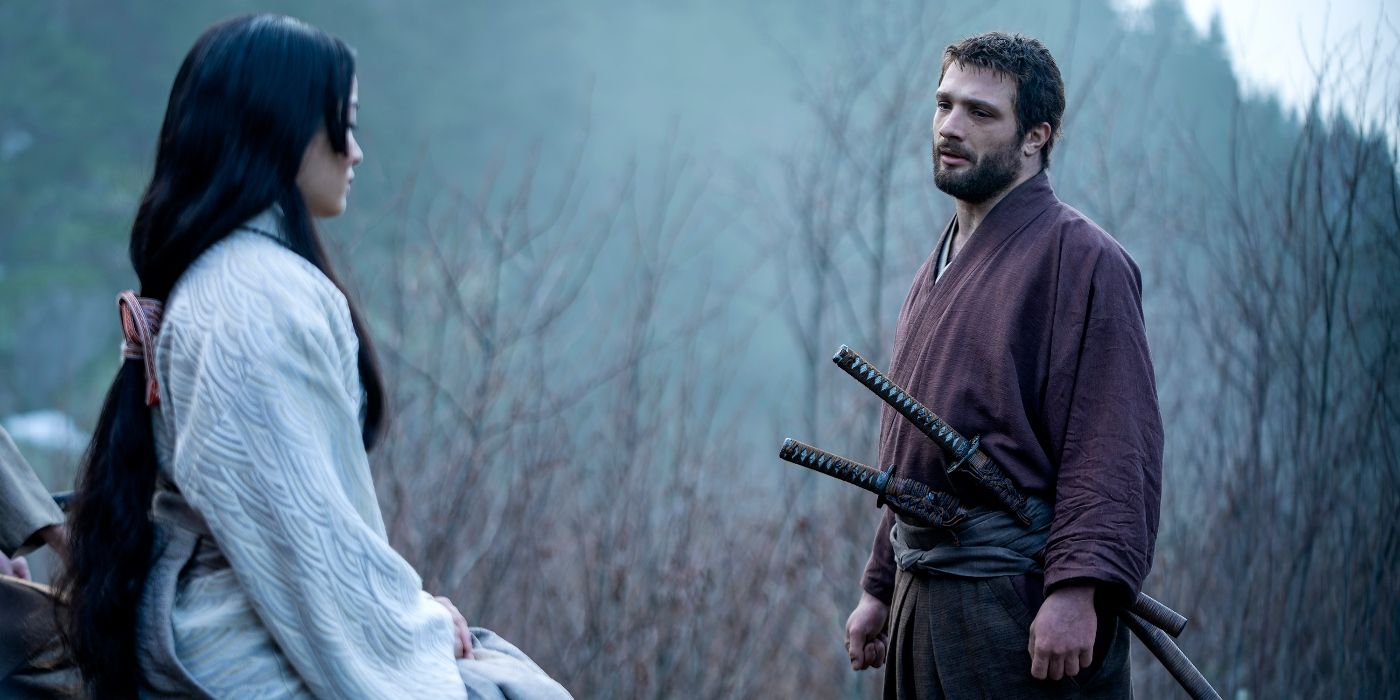
Chemistry is a fascinating beast. It either exists between actors or doesn’t; simple as day. A romance thrives or perishes by chemistry, and Anna Sawai and Cosmo Jarvis have chemistry in enough spades to bridge an ocean. (Blackthorne doesn’t need his beloved ship back. They are the ship.) Their emotional friction is multifaceted because there’s no circumstance where their romance could be anything less. Both characters navigate uncharted territory and situational cages. The chains of Mariko’s emotional heartbreak rattle her every step, even though she never sacrifices her dignity. Physically, Blackthorne is quite literally trapped, a bristling mercenary turned into an unwilling pawn. Jarvis makes Blackthorne’s journey from ignorance to acceptance effortlessly engrossing, ensuring that his character’s intelligence sneaks through even when Blackthorne remains stubbornly dense.
Together, Sawai and Jarvis play a range: fraught yet tender, electric but combative. The world’s unlikeliest fictional pair fit together as easily as air and spark like bonfires. The allure they feel is preternaturally strong yet not worth the risk, except for the one moment it’s worth everything. If I thought the hot springs scene was breathtaking, then the brothel exchange left me unconscious. During the latter, Sawai plays Mariko as taken aback by the depth of her feelings. The yearning in Jarvis’s eyes as they trail Mariko’s movements (or drink in her stillness) is acute enough to simultaneously melt the earth and burn it. In a word, they’re bewitching.
‘Shōgun’s Romance Is Doomed but Worth the Pain
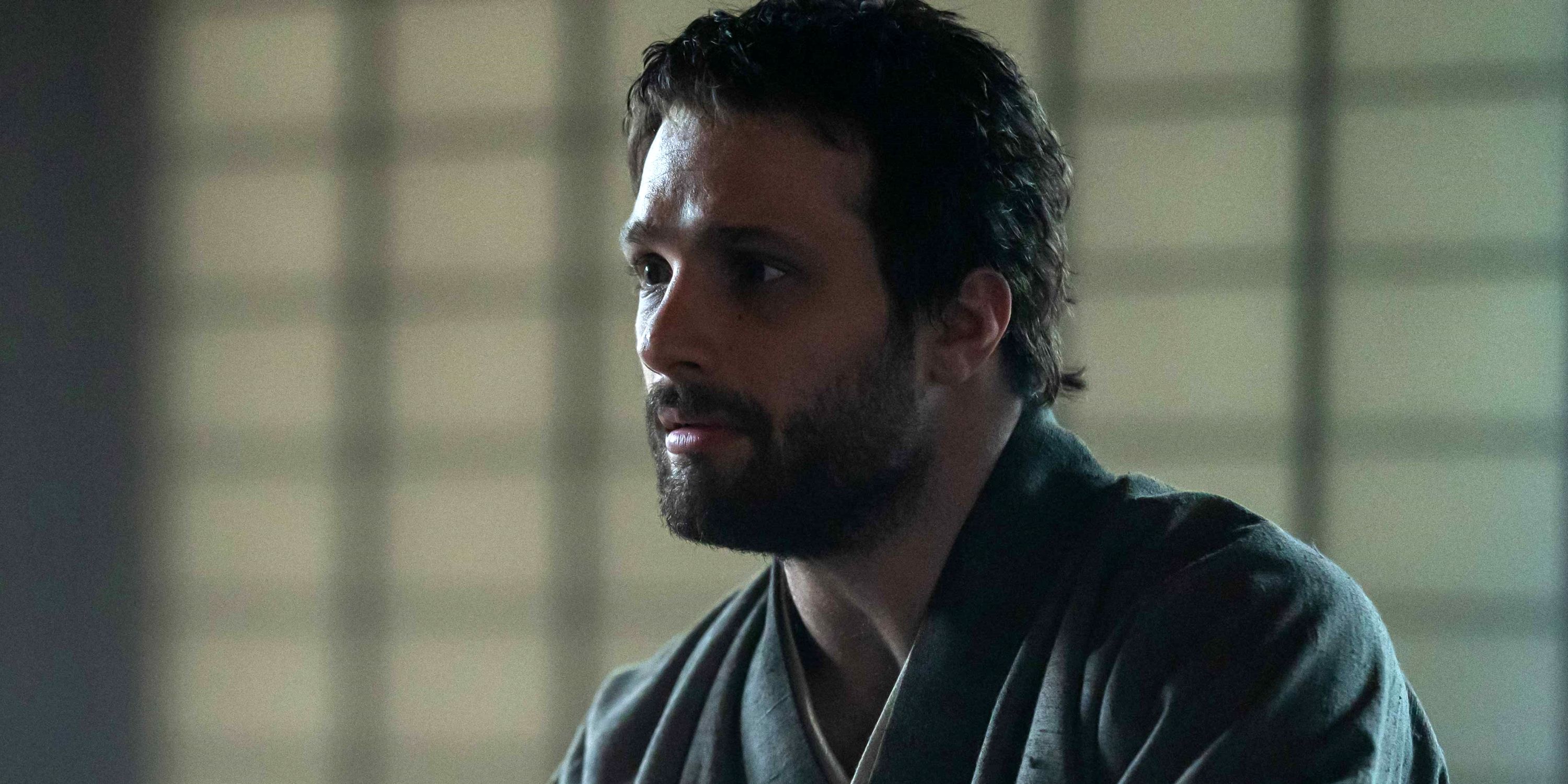
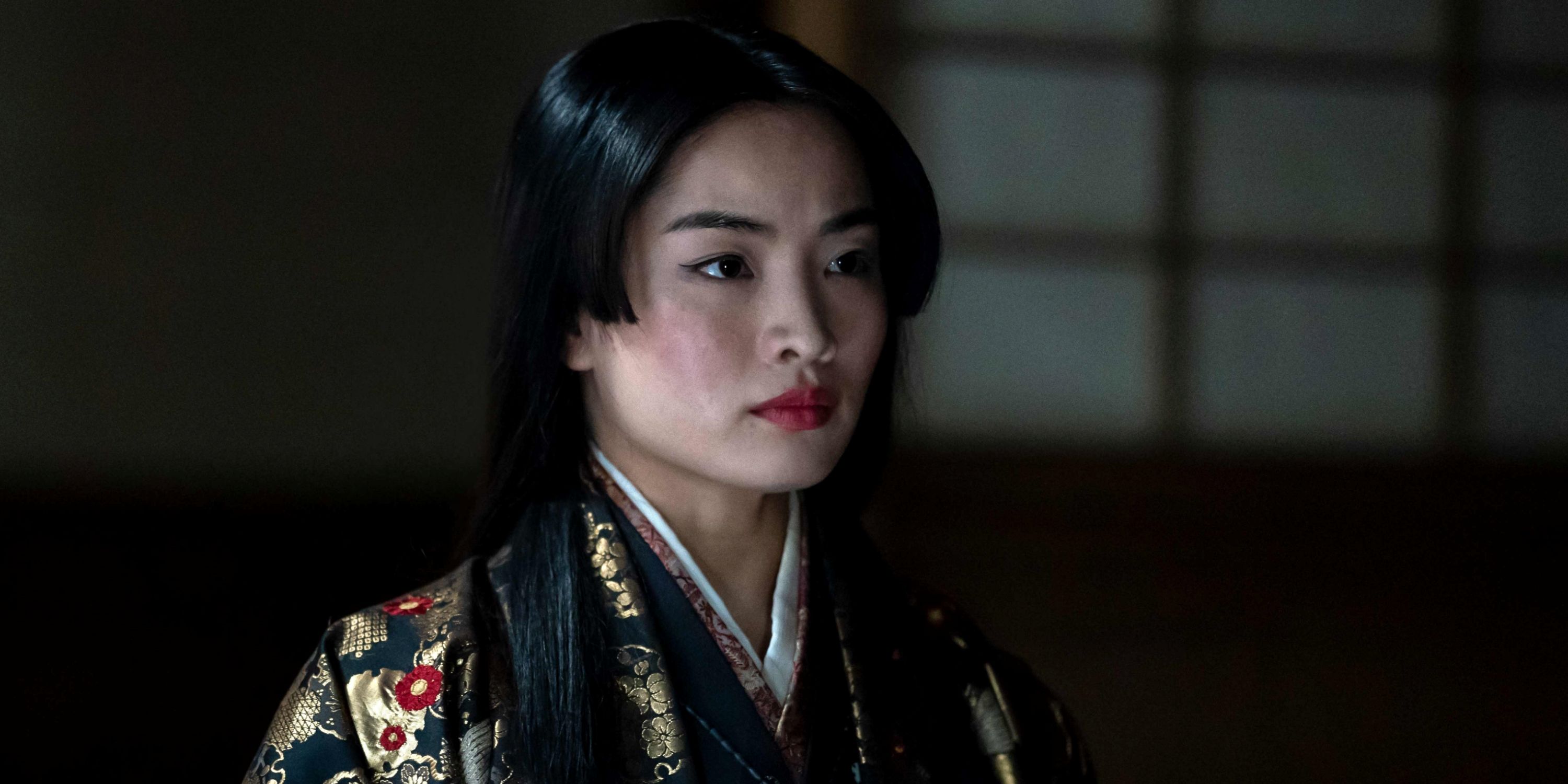
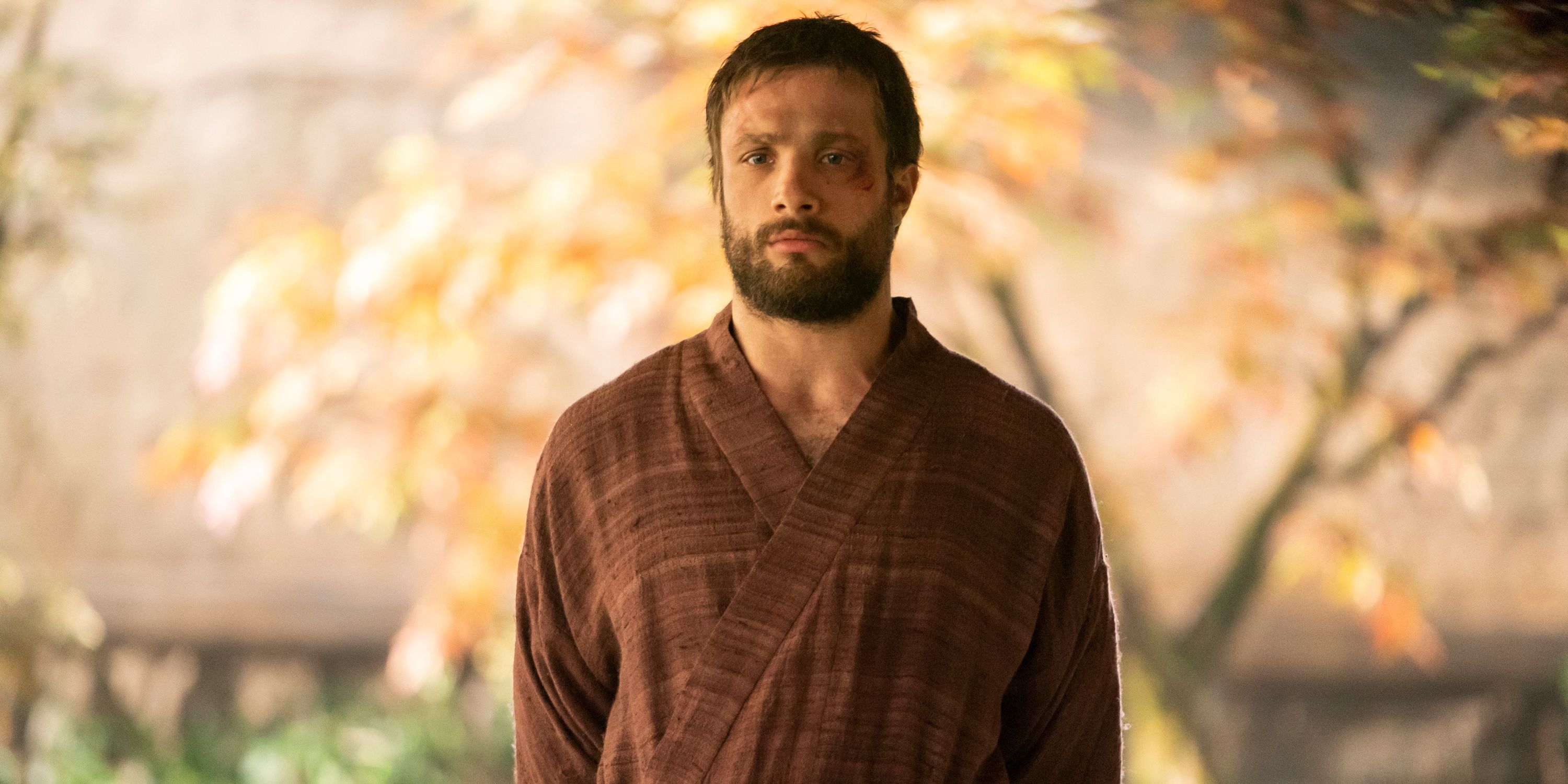
Mariko’s upcoming voyage marks the first time she and John won’t be joined at the hip. The trailer for Shōgun‘s penultimate episode does tease an emotional scene between them. Beyond that: who knows? More unconsummated longing and loaded sentences? Do we stand any chance of a kiss? The latter’s as unlikely as a happy ending, which, admittedly, makes Anna Sawai and Cosmo Jarvis’s chemistry seem underutilized. An explicit (take that as a double entendre, or don’t) Blackthorne-Mariko romance could have amplified the series’ emotional stakes even higher.
That said, Shōgun‘s time is limited. Justin Marks and Rachel Kondo had to use their 10 episodes wisely, and they prioritized character arcs. And, let’s admit it: keeping Marithorne (if I invented their ship name, you’re welcome) perpetually apart enriches their tale’s tragedy. Their pining, their mirrored displacements, and the meeting of cultures that mesh but cannot achieve symbiosis: their romance represents the series’ heart. In another reality, this pair might have a chance. As it stands, they’re as akin to soulmates as the situation permits. No matter how Shōgun concludes, this couple will destroy me. To adapt the title of an upcoming Taylor Swift song, “I Can Do It (the last two Shōgun episodes) with a Broken Heart.” I’ll be in good company. John and Mariko’s hearts were shattered long ago.
